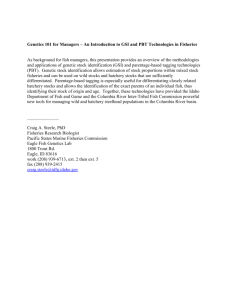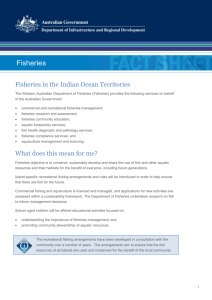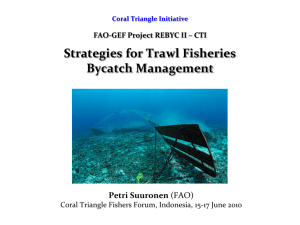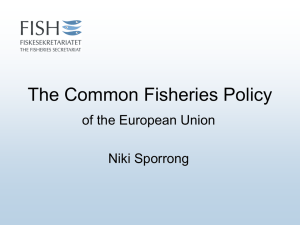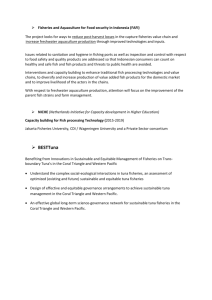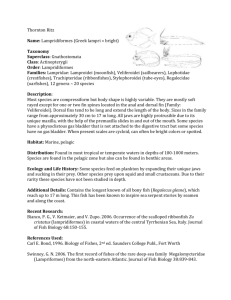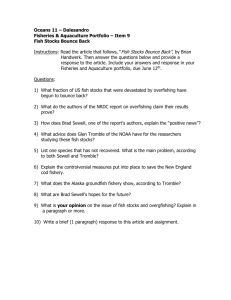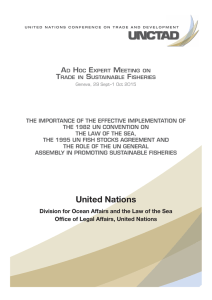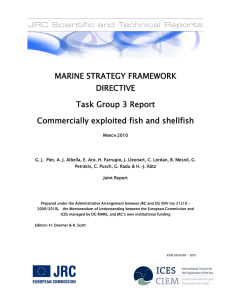REF: DR05133
advertisement
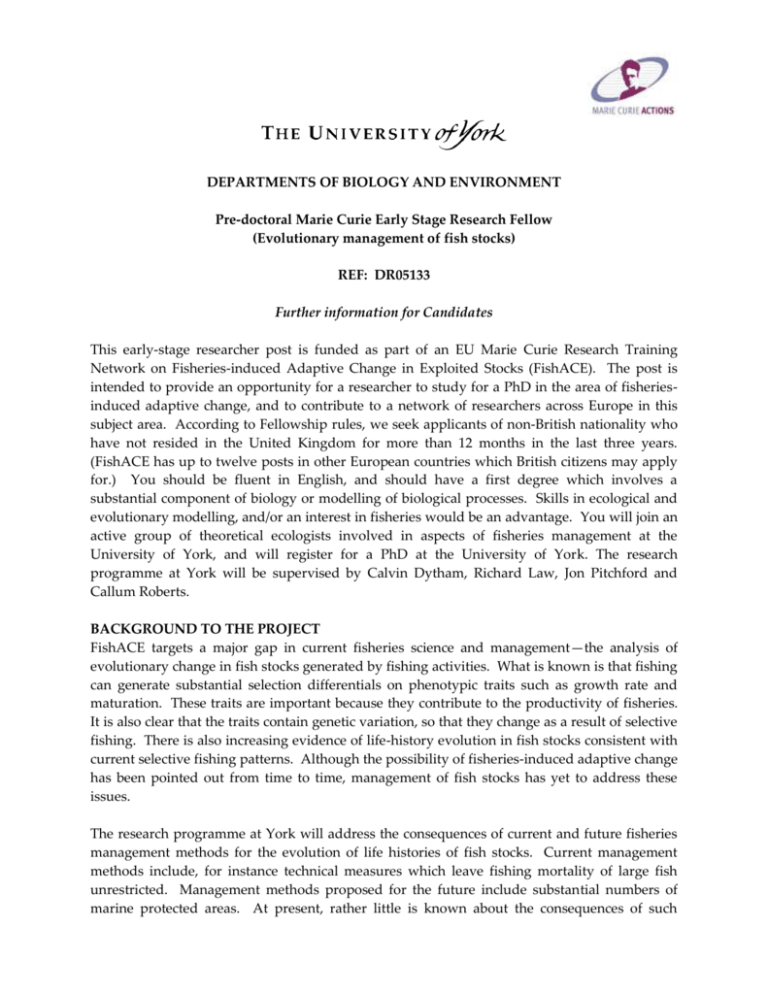
DEPARTMENTS OF BIOLOGY AND ENVIRONMENT Pre-doctoral Marie Curie Early Stage Research Fellow (Evolutionary management of fish stocks) REF: DR05133 Further information for Candidates This early-stage researcher post is funded as part of an EU Marie Curie Research Training Network on Fisheries-induced Adaptive Change in Exploited Stocks (FishACE). The post is intended to provide an opportunity for a researcher to study for a PhD in the area of fisheriesinduced adaptive change, and to contribute to a network of researchers across Europe in this subject area. According to Fellowship rules, we seek applicants of non-British nationality who have not resided in the United Kingdom for more than 12 months in the last three years. (FishACE has up to twelve posts in other European countries which British citizens may apply for.) You should be fluent in English, and should have a first degree which involves a substantial component of biology or modelling of biological processes. Skills in ecological and evolutionary modelling, and/or an interest in fisheries would be an advantage. You will join an active group of theoretical ecologists involved in aspects of fisheries management at the University of York, and will register for a PhD at the University of York. The research programme at York will be supervised by Calvin Dytham, Richard Law, Jon Pitchford and Callum Roberts. BACKGROUND TO THE PROJECT FishACE targets a major gap in current fisheries science and management—the analysis of evolutionary change in fish stocks generated by fishing activities. What is known is that fishing can generate substantial selection differentials on phenotypic traits such as growth rate and maturation. These traits are important because they contribute to the productivity of fisheries. It is also clear that the traits contain genetic variation, so that they change as a result of selective fishing. There is also increasing evidence of life-history evolution in fish stocks consistent with current selective fishing patterns. Although the possibility of fisheries-induced adaptive change has been pointed out from time to time, management of fish stocks has yet to address these issues. The research programme at York will address the consequences of current and future fisheries management methods for the evolution of life histories of fish stocks. Current management methods include, for instance technical measures which leave fishing mortality of large fish unrestricted. Management methods proposed for the future include substantial numbers of marine protected areas. At present, rather little is known about the consequences of such management for evolution of life histories of fish stocks. With understanding of the consequences for life-history evolution, the intention is to look for management methods that will both help maintain stocks in the short term and also put in place selection that is beneficial in the longer evolutionary term. We envisage that this research programme will involve a substantial amount of computer-based modelling of ecological and evolutionary dynamics of a chosen fish stock, such as North Sea cod, under a variety of management scenarios. We anticipate that the work will be greatly enhanced through interactions involving visits to and meetings with other researchers in the FishACE network. The other centres in the network include: Austria: International Institute for Applied Systems Analysis, Laxenburg (coordinating centre for the network) Denmark: International Council for the Exploration of the Sea, Copenhagen France: Research Institute for Exploitation of the Sea, Marine Fisheries Laboratory, Porten-Bessin France: Research Institute for Exploitation of the Sea, Genetics and Pathology Laboratory, La Tremblade Iceland: Marine Research Institute, Reykjavik Iceland: Hólar University College, Hólar Netherlands Institute for Fisheries Research, Ijmuiden Norway: Institute of Marine Research, Bergen Sweden: Lund University, Lund Sweden: National Board of Fisheries, Department of Research and Development, Öregrund The combined expertise of these centres will be available to the appointee through the network, and offers an exceptional opportunity for career development of an early-stage researcher. Further information about FishACE may http://www.iiasa.ac.at/Research/ADN/FishACE/ . be found on the website at: PERSON SPECIFICATION Qualifications Essential First degree involving a substantial component of biology or modelling of biological processes. Skills/abilities/competencies Personal Attributes Desirable Ecological and evolutionary modelling and/or an interest in fisheries. Must be of non-British Nationality and not resident in the UK for more than 12 months in the last three years. DEPARTMENT OF BIOLOGY, UNIVERSITY OF YORK The Department is one of the leading centres for biological teaching and research in the UK. It has an integrated approach to Biology, with no barriers between disciplines and both teaches and undertakes research across the whole spectrum of modern Biology, from molecular genetics and biochemistry to ecology. The Department occupies a single set of purpose-built teaching and research laboratories at the west end of the University campus. Our new laboratories, funded by a £21.6M JIF award from the BBSRC, opened in July 2002, and include the innovative Technology Facility. This facility is key in enabling our researchers to gain access to state-of-the-art equipment and the associated expertise to use such equipment effectively. Created as part of the recent JIF award, the Technology Facility is centrally located within the Department and has some 2,000m2 of laboratory space, £5 million of new equipment, and 16 expert staff members. The Technology Facility has six specialist laboratories, each led by an experienced technologist with trained technical support. These centres include a computational facility with Windows and UNIX high performance computers, terabyte hierarchical data storage system, specialised software tools, computing system and data analysis expertise, which will be available for the research programme. The Department was graded 5 in both the 1996 and 2001 Research Assessment Exercises and has an annual research income of over £7M. We have 45 academic staff plus 25 senior Research Fellows, approximately 100 contract research staff, 150 graduate students, nearly 100 technical staff, 37 administrative staff, and approximately 400 undergraduates. Several senior positions in the Department are funded by charities or industry, including eight Research Professorships, two funded by Yorkshire Cancer Research, one by York Against Cancer and five by the Garfield Weston Foundation. A research lectureship is funded by Smith & Nephew. We have numerous independently-funded research fellows, with support from the Wellcome Trust, BBSRC, the Royal Society, the Lister Institute and the Arthritis Research Council. These external links are an essential feature of the Department. Further information about the http://www.york.ac.uk/depts/biol/ . Department may be found on the website at: ENVIRONMENT DEPARTMENT, UNIVERSITY OF YORK The Environment Department aims to bridge the gap between the disciplines of ecology, economics and environmental science, and to use this interdisciplinary focus to incorporate ecological and environmental principles into decision making. The Department undertakes research and teaching in the ecology, economics, management and sustainable use of natural resources. It has a strong global focus and offers several undergraduate and postgraduate degrees attended by students from all over the world. There is a major emphasis on developing country problems both in teaching and research. THE UNIVERSITY OF YORK The University of York occupies an attractive campus environment 2 km from the city centre. The University comprises a relatively small number of high-quality departments, and enjoys an excellent reputation in both teaching and research (which, regardless of index used, places York among the top 10 universities in the UK). The University has three very large Science Departments (Chemistry, Biology and Physics), with increasing prominence given to both Health Sciences and Economics, Psychology, and particularly Computer Science, all of which did outstandingly well in the research assessment. The new Hull York Medical School is a further addition to the university. The historic City of York enjoys excellent rail links with the rest of the UK: the high-speed East Coast line provides a regular service which enables access to London within 1 hr 40 min and to Edinburgh within 2 hr 15 min. There is also a direct rail link to Manchester and Manchester Airport. INFORMAL ENQUIRIES Informal enquiries may be made to Dr Richard Law (+44 1904 328586, RL1@york.ac.uk). SALARY Starting salary will be £19,460 per annum on Grade IB of the scales for Research staff, plus travel and career exploratory allowances. This post is available for a period of three years, starting between 1 May and 1 October 2005. The candidate appointed may, immediately upon starting his/her employment, join USS – the Universities’ Superannuation Scheme – which involves a personal contribution of 6.35% of salary and a University contribution equal to 14% of salary. ASYLUM & IMMIGRATION ACT (1996) In accordance with the Asylum and Immigration Act (1996), if you are successful in your application for this post you will be required to provide, before you start work at the University, one document from a specified list to evidence that you are legally entitled to live and work in the UK. Further details about this requirement are enclosed with the formal written offer of employment. HOW TO APPLY Please send four copies of the following: letter of application; full curriculum vitae, including the names and addresses (and e-mail addresses wherever possible) of three referees. Your application should be sent, together with one copy of your completed equal opportunities monitoring form, to the Personnel & Staff Development Office, University of York, Heslington, YORK YO10 5DD. Please quote reference number DR05133 when applying. Please note that emailed applications will not be accepted. The closing date for receipt of applications is Thursday 2 June 2005. The University will assume that it is free to approach referees at any stage unless the candidate states otherwise in his/her application (i.e. candidates who wish a referee or referees to be approached only with their specific permission and/or if they were called to interview, are asked to state such requirements explicitly alongside the details of the relevant referee(s)). It is anticipated that interviews for the post will be held as soon as possible and certainly no later than one month after the closing date for applications. If you have not been invited for interview within that time scale, we should like to thank you for the interest you have shown in working for the University, but you should assume that on this occasion your application has been unsuccessful. Applicants who are short-listed for interview will be sent details of time and venue as soon as possible. The University regrets that it is unable to give feedback to candidates who are not short-listed for interview. For some posts we can receive more than one hundred applications and the reason why an applicant is not short-listed is often because there were a large number of applicants, rather than because of any deficiency in the individual’s application. Short-listed applicants may seek feedback, although again the reason why candidates are unsuccessful is rarely because of any failing on their part that may be dealt with by remedial action, but rather that there was an outstanding individual amongst the excellent candidates invited for interview. As soon as reasonably practicable after the interviews have taken place the Personnel and Staff Development Office will write to the successful applicant offering him/her the post. Upon receipt of formal written acceptance of the post we will write to notify unsuccessful candidates. Whilst we try to do this in as effective and efficient manner as possible, sometimes the process can take rather longer than is ideal because of the need to recall candidates for a second interview and reconvene interview panels and/or due to routine disruptions caused by leave and other absences. We apologise for any delay and inconvenience caused in these circumstances. Should you have any queries regarding your application, please do not hesitate to contact the Personnel & Staff Development Office (tel: 01904 434835). *** *** *** *** *** With the compliments of the Personnel & Staff Development Office Ref: DR05133 Date: 4 May 2005
